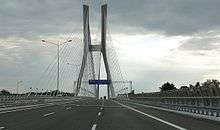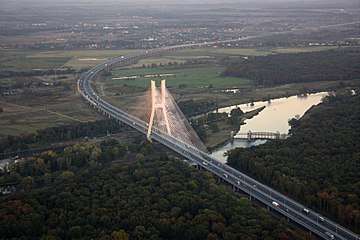Rędziński Bridge
| Rędziński Bridge Most Rędziński | |
|---|---|
|
The Rędziński Bridge illuminated at night. | |
| Coordinates | 51°9′24″N 16°57′35″E / 51.15667°N 16.95972°E |
| Carries |
6 lanes of |
| Crosses | Oder |
| Locale |
Wrocław, Lower Silesia, |
| Maintained by | GDDKiA |
| Characteristics | |
| Design | Cable-stayed |
| Material | Reinforced concrete and steel |
| Total length | 1.7 km (1.1 mi) or 1,742 m (5,715.2 ft) |
| Width | 38.58 m (126.6 ft) |
| Height | 122 m (400.3 ft) |
| Longest span | 256 m (839.9 ft) |
| No. of spans | 4 (50+256+256+50 m) |
| Clearance below | 18 m (59.1 ft) |
| History | |
| Designer | Jan Biliszczuk |
| Construction start | 2008 |
| Construction end | 2011 |
| Opened | 31 August 2011 |
The Rędziński Bridge (Polish: Most Rędziński) is a cable-stayed bridge spanning the Oder river in Wrocław, Poland. As a section of the A8 motorway bypassing the center of Wroclaw, the bridge links both sections of the route across the Oder, providing connections to the A4 motorway to the south, and to the future sections of the S5 and S8 expressways to the northeast. With its pylon reaching a height of 122 m (400 ft) and having a total length of 1.7 km (1.1 mi), the Rędziński Bridge is the tallest and longest bridge in Poland.[1]
History
Designed by Jan Biliszczuk, a professor of engineering at the Wrocław University of Technology, the bridge's design exceeded the length of the Solidarity Bridge in Płock by 30 m, then the longest bridge in the country.[2] The contracts for the bridge's construction were awarded to the Warsaw-based Mostostal consortium and its parent Spanish firm, Acciona Infraestructuras on 20 May 2008, with construction commencing shortly afterwards.[3] Construction of the bridge (and its main A8 motorway) continued for the next three years. Building efforts were temporarily halted during the 2010 Central European floods, but later resumed after a short delay.[4]
The structure was unofficially named the Rędziński Bridge by its builders due to the bridge's spanning of Rędzińska Island in the Oder. In August 2011, the Wrocław bureau of GDDKiA, the branch of the Ministry of Infrastructure tasked to roads, organized a naming competition of the bridge. After over 15,000 ballots cast, "Rędziński" won 55 percent of all total votes.[5] The name defeated other popular choices such as "Śląski" by a wide margin.[6]
Construction was completed by the end of August 2011. Financial costs for the bridge are estimated at 576 million PLN.[7] Shortly before the bridge's opening to public traffic, coinciding with the opening of the last sections of the A8 motorway, Prime Minister Donald Tusk visited the sight and praised its engineering. "This, I think, is a very good place and a very good moment to say that Poland is really under construction in a breathtaking way, at least in some places," Tusk was quoted.[8]
The bridge opened to A8 traffic on 31 August 2011.[9]
Main span has 512 m long and consists of two cable-stayed spans 256 m long each. The bridge is the longest cable-stayed bridge with one pylon in Poland.
Images
- Rędzińska Island, September 2006
- May 2010
 August 2010
August 2010- March 2011
- May 2011
 Completion, August 2011
Completion, August 2011 In operation, October 2011
In operation, October 2011
See also
References
- ↑ "Rędziński kolos - największy most w Polsce" (in Polish). Gazeta Wyborcza. 2011-08-26. Retrieved 2011-09-12.
- ↑ "Most musi cieszyć" (in Polish). Gazeta Wyborcza. 2010-02-24. Retrieved 2011-09-12.
- ↑ "Autostradowa Obwodnica Wrocławia - Priorytetowa inwestycja drogowa Dolnego Śląska" (in Polish). Nowoczesne Budownictwo Inzynieryjne. 2011-08-23. Retrieved 2011-09-20.
- ↑ "Powódź zatrzymała budowę mostów wrocławskich obwodnic" (in Polish). Gazeta Wyborcza. 2010-05-26. Retrieved 2011-09-12.
- ↑ "Wrocław residents name their new bridge". Wroclove2012. 2011-08-28. Retrieved 2011-09-12.
- ↑ "Wyniki ankiety wyboru nazwy mostu AOW" (in Polish). GDDKiA. 2011-08-23. Retrieved 2011-09-20.
- ↑ "Rędziński Bridge". Wroclove2012. 2010-07-20. Retrieved 2011-09-20.
- ↑ "Wrocław: new motorway, stadium and air terminal". Chancellery of the Prime Minister of Poland. 2011-08-27. Retrieved 2011-09-12.
- ↑ "Wrocław: Most Rędziński już otwarty" (in Polish). Budbazar. 2011-08-31. Retrieved 2011-09-20.
External links
- Bridge technical information (in Polish)
- Construction of A8 motorway (in Polish)
- Pictures of Rędziński Bridge (construction, the views from the top)